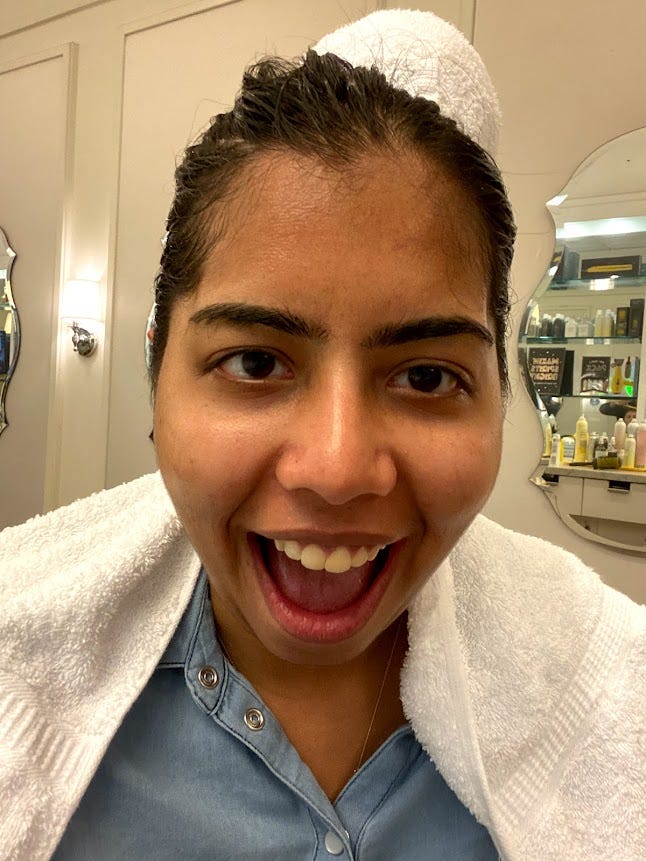On girl(woman)hood: Part II
Being a girl & woman across family, love, school, tech, and beyond.
Prelude: this essay is the second part of my essay exploring being a girl/woman across family, love, tech, and beyond. For part one and additional context, click here.
V. The Matrix of Tech
Working in the tech industry felt like being in the Matrix. Sometimes, I was so in the flow, completely focused on my work and team. Other times, I was reminded, sometimes against my will, that I was a woman, which had a specific connotation around how I was supposed to behave.
My first software engineering internship, I had a cohort of supportive female interns and a rockstar female mentor that made me feel at home in a new corporate environment. But I also had a male intern who kept incessantly pinging me on Facebook Messenger, asking me what I was up to. Some of the questions were harmless, like how I was finding the internship or the food on campus. But it quickly escalated into more personally invasive questions, like if I had a boyfriend and what I was doing in my spare time. I made it clear that I did have a boyfriend (which was true), hoping that it would serve as enough of a deterrent. But he was persistent. At one point, he became so frustrated, he threatened to come to my apartment when I refused to come to a hackathon that he was participating in. I was so scared that he would try to do something to me. I regretted not taking the self defense classes my mother had always told me to take. I immediately blocked him and locked my doors. I contemplated reporting him, but harassment felt too scary of a word to embrace. Plus, he hadn’t actually done anything to me. I didn’t want to be the girl crying wolf. So, I moved on, despite running into him multiple times throughout the course of the internship.
When I transitioned to product management, my next challenge was to find the courage to speak up in bigger meetings. I knew that I would only be respected as a leader if I contributed. But every time I tried to speak, my body betrayed me. My heart pounded, there was a distinct ringing in my ears, and my breath felt shallow. I would look around the room, in awe of the men arguing with each other, passionately fighting for their ideas. It reminded me of my days on the debate team, where I would watch debaters swinging pens and scribbling arguments, spewing them out at 80 words/minute and staring into the audience with piercing, dominating eyes.
I Googled articles about finding the courage to speak up, many of them targeted at women. Using this advice, I designed an OKR for myself to speak in at least one meeting every day. Even if people think it’s stupid, at least I would have tried, and well, that’s all I could really ask for. Over time, I learned that I found it a lot easier to speak up when I began with the statement: “I could be wrong and I don’t have all the facts, but…” Somehow, it made it more palatable for others to listen to me as well.
As I grew in my product career, I realized that I was using limiting language. According to Sheryl Sandberg and other leading #leanin advocates of the time, girl bosses didn’t use limiting language. So, I enrolled in courses and hired an executive coach to learn how to stop apologizing for my thoughts and assert myself.
But it wasn’t as easy as dropping words like “sorry” or “just.” In fact, when I asserted myself like I imagined a girl boss should, I often got the opposite reaction. I was called “aggressive,” “emotional,” and the worst of them all: “bulldog.” Some days, I took the feedback, viewing it as an opportunity to finesse my tone, which is something I had been told by my parents I needed to work on. But other times, I felt uncontrollable rage at the moving target of “acceptable” female behavior. In one such moment, I confronted one of the individuals who gave me this feedback, who was six levels above me. I asked: is it possible that this is gendered feedback? His response: I have a daughter, a wife, therefore I cannot be sexist. I had to re-read the screen multiple times. He suggested that I work on my leadership skills. I exited the chat and cried in the bathroom.
But, there were other parts of the PM role that came naturally to me. I organized social events that brought the team together. was the team mom: bouncing around the room, checking in on people, making conversation by asking lots of questions, monitoring what I said for anything that could potentially be perceived as offensive. It was admin, thankless work, but it made people like me, especially the engineers on my team, which helped me over time. It became easier to convince people of my point of view. When I made mistakes, people were more forgiving. I didn’t know if it’s because I felt psychologically safer since I felt more connected with my teammates, or if they didn’t see me as threatening.
I was transforming into a real product leader, but I wondered: am I successful because I’m playing the role of what a “female product leader” is supposed to look like, or is it because I’m “stepping into my own power”?
Is this who I am, or is this who I have to become to be taken seriously?
VI. Jealousy, Jealousy
At some point, I realized that I was special. There weren’t a lot of female product managers at my new company in San Francisco, and there weren’t that many that had risen as fast as me. Instead of feeling satisfaction from this fact, all I felt was the pressure to maintain appearances. What would happen if it was, in fact, a mistake? Or worse, it wasn’t a mistake, but I couldn’t live up to the expectations? Welcome to the mind of an anxious individual.
Then, it happened. Another woman joined the company, someone that I had referred after she slid into my LinkedIn DMs. She had the same elite college pedigree and FAANG credentials. We became fast friends, trading tips, joint Halloween costumes, and inside jokes. But when I found out she was promoted in a similar timeline to me, I found it difficult to muster the enthusiasm at her success. “Congratulations,” I squeaked, and when worried that I had given myself away, overcompensated with more fake enthusiasm.
Jealousy felt like a poison I couldn’t escape. I felt like I was behind with the next promotion. I kept comparing our remarks, projects, and work extracurriculars, finding ways to stand out, all while hating myself for having these thoughts. Rationally, I knew the comparison mindset further perpetuated the false notion that there were limited spots for women, when we really needed to focus on expanding on the pie. But emotionally, my ego was nowhere close to accepting this truth. My worst fears were confirmed when I got a “Meets Expectation” in my next performance review.
Three months before I left the company, we had our annual holiday party. She and I had decided to get ready together, booking a Drybar hair appointment. At this point, I had given up all hope of achieving the next stage of my career at this company, and was actively interviewing for roles in New York. While we got our hair washed, we were talking about something irrelevant, and a blob of guilt rose inside of me. You need to come clean, a voice inside of me said. No, I fought back. I’m not jealous anymore. I’m also leaving. I don’t want to lose her as a friend. But the feelings of guilt grew bigger, metamorphosing into shame. Honesty is the basis of trust, the voice repeated over and over until I couldn’t take it anymore.
“You know, when you got promoted, I got jealous.” I said on the Lyft ride back to our apartments. She was taken aback. Asked me lots of questions. Told me she was glad I had come clean, that it was brave. Shared her own experiences of professional jealousy. I felt something release within myself, the warm feeling of acceptance. I had exposed an ugly part of myself and she still wanted to be my friend. I was loved, even though I wasn’t perfect. I felt gratitude for the power and magic of sisterhood, the space to be human.
We later celebrated our friendship with funny faces at the photo booth.
VII. Irish Exit
Four years and three jobs later, I was on the cusp of taking a break from product. I had been asked to switch to a new team, and I was four weeks into my onboarding. I was in a introductory 1:1 with a colleague, an engineer. This was our third attempt at scheduling a meeting, and I knew he was annoyed at me. I wanted things to go well.
It started off pretty normal: he asked me questions about my background and clarification on my role, especially since a lot of the day to day operations were being managed by my direct reports. When he asked me my thoughts on my role, I had to find the right balance of being honest about how I really felt but not too honest that I revealed too much about my potential future plans.
Suddenly, he began divulging his opinions on the team and leadership, telling me that he’s been here long enough that he no longer cares about being too honest. “Look around. There’s barely any women or people of color on the team. It’s because it’s a boy’s club up there.”
It wasn’t lost on me that a white man telling a woman of color, especially someone who is new, about the diversity challenges on a team is inanely ignorant. Do you not realize that I have also noticed the lack of diversity around me, after being reminded of it in every single meeting? I was pissed off, but I kept my cool, reminding myself that what I really wanted was to get the relationship back on track.
“I totally get how you feel.” I said, quelling the anger and fear in my voice. “It’s difficult to find belonging when no one else looks like you”
He looked disappointed, as if he wanted more out of me. I shifted the conversation back to the team, and when he had nothing more to add, thanked him for his time.
I had a hard time paying attention the rest of the day. When I later saw Slack messages from an ERG group promoting a “frank and open panel discussion” with Asian executives about what it means to be an authentic leader in the workplace, I almost lost my shit. I didn’t understand how attempts at corporate diversity performativity always made it feel like a choice. Like, you get to have a choice in what kind of a leader you get to show up as. But is it a choice?
Every time I start at a new company I convince myself that this time it will be different. This time, it will feel like a choice. Yet the chips fall as they fall, followed by the disenchantment and the anguish and the self-hatred of I should have known better, followed by a search for greener pastures, repeating the cycle again. Maybe I should have been more honest with him, signaling a potential for vulnerability. I could have told him about my previous toxic workplaces and sexist bosses, the mindfuck of having experienced sexism from men and women while having certain male bosses and mentors that have changed my life, that I’ve tried fighting this fight and been burnt so bad, that I feel like a victim but also I’ve benefitted from my time in the industry, so am I really a victim in the first place?
I thought back to the little girl who loved all of the girly things: the big, poofy dresses, the flowery smelling soap, the dolls, the cooking toys, cute earrings, and smoked kaajal under her eyes. I wondered if she would be proud of me: a woman who retained her core femininity while changing herself just enough to make something of herself. Or would she be disappointed at the masculine tone of my voice when I couldn’t hide my frustration over being talked over again, or the way I stopped questioning if I was taking up too much space. Or would she not really care because she was five and who cares about these “adult” problems.
“If I leave, is it because I couldn’t take it? Because I’m a victim?” I asked a friend, referencing my future departure plans.
She shrugged. “Aren’t your reasons to leave separate from gender politics?”
“But what if I become a statistic? Even if my reasons to leave are separate from the gender politics?” I asked her.
“Does that change anything?” she asked.
I considered this. Perhaps I’d been looking at this the wrong way, boiling a complex issue into a binary choice when in reality, it was a multidimensional spectrum. I could be feminine and masculine. I could be naive and experienced. I could be an authentic leader while playing into the stereotype of the type of leader I’m supposed to be. I was a victim and a winner. It wasn’t a bug. It was an intentional byproduct of hacking a system not built for people like me.
“No?” I replied.
I repeated the word until it became more certain, my voice and tone matching the growing conviction in my heart.
Thing of Note
Nothing to note this week, other than an update. My next essay (and first for 2024) will be a reflection of the first three months of my sabbatical, and a peek into the clarity I’ve had about my career, learning about ambition and energy management, and what I’m planning next. Stay tuned for more, and have a happy holiday and New Year <3
Thanks for Reading!
I’m on a journey to create a blended career across the creative arts, tech, and business. This newsletter is my way of sharing my reflections, thoughts, and advice along the way. Here are some ways to support or further collaborate together!
I would love feedback on this post.
If you want to see more content like this, heart the post.
Hearing from readers also gives me a ton of energy. I’d especially love to hear from women-identifying folks about their stories wrestling with the meaning and expectations of their gender, if you feel comfortable sharing. Feel free to hit reply to the email to send it to me in private, or if you’re feeling like it, post it in the comments for others to experience.
If you’re figuring out your own career transition or looking for more support in your product career, consider working with me as a coach. Here’s my calendly if you want to get the ball rolling.







I appreciate you sharing your story Vinamrata! I come from a traditionally male dominated field (tech sales) as well and related to a lot of what you wrote. When I left my job, I knew I needed a break, but there was a part of me that really struggled with the idea that I was a woman leaving a male dominated space. I knew it wasn't my calling regardless, but I didn't want the perception to be that I couldn't even handle it. Of course, no one really cared except me, but it was a strange identity think I needed to detach from. Thank you for being so open about your experiences! You're so inspiring to me no matter what path you're on!
Hey Vinamrata,
This piece really spoke to and moved me. I can’t tell you how much I was nodding along to. As we’ve talked about it before, I’m taking time to rework my relationship to work, labor, and tech. This piece really reminded me that the frustration and burnout I experience may not be my own incompetency, but more so me trying my best to function in a system and environment that was not created for me flourish. Thank you so much for the vulnerability and sharing. Additionally, really great writing. I feel like you put in words something so many of us (female identifying people in tech and in the world) have been feeling. Thanks again.